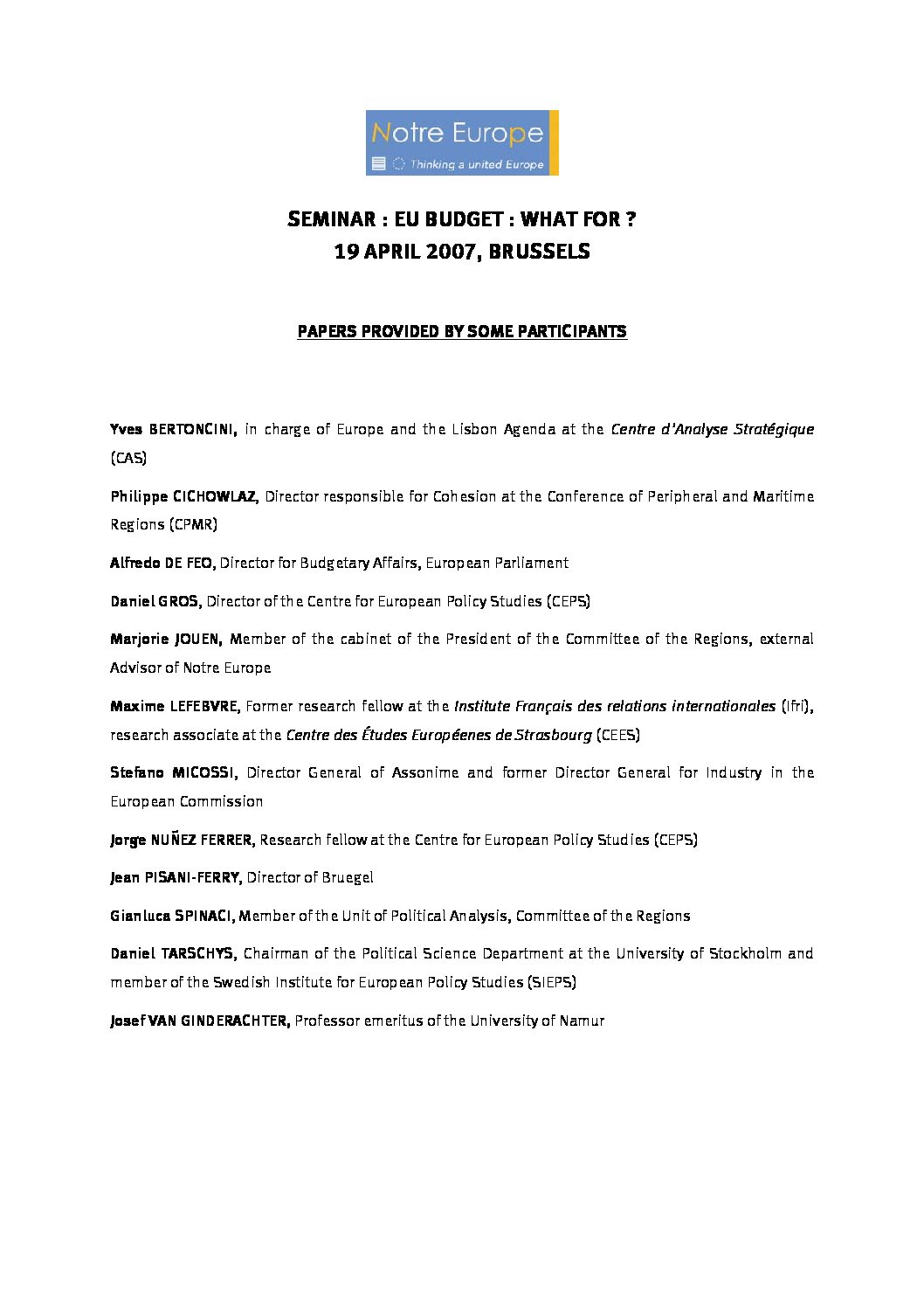Other document
The EU budget: What for?
This synthesis paper covers the main points of discussion raised in Notre Europe’s seminar on the EU budget, held on 19 April at the Committee of the Regions in Brussels. Academics, policy researchers and representatives of EU institutions debate the possible components of budget reform, focusing on allocation; redistribution; macroeconomic stabilisation; the budget’s size and structure; the financing system; and the decision-making process. The discussions revealed a broad consensus on the need to re-think the structure and content of the EU budget as well as to improve the budgetary decision-making.
This synthesis paper covers the main points of discussion raised in Notre Europe‘s seminar on the EU budget, held on 19 April at the Committee of the Regions in Brussels.
Academics, policy researchers and representatives of EU institutions debate the possible components of budget reform, focusing on allocation; redistribution; macroeconomic stabilisation; the budget’s size and structure; the financing system; and the decision-making process.
The discussions revealed a broad consensus on the need to re-think the structure and content of the EU budget as well as to improve the budgetary decision-making.
Introduction
In December 2005, the European Council adopted a final compromise for the medium-term financial perspectives for 2007-2013. While expressing satisfaction for the achievement of a compromise which had been particularly difficult to reach, a final clause was added inviting the Commission to undertake a full, wide ranging review covering all aspects of EU spending, including the CAP, and of resources, including the UK rebate” to report in 2008/2009.
The discussions revealed the existence of a broad consensus on the need to re-think the structure and content of the EU budget as well as to improve the budgetary decision-making system. There was, for instance, a general agreement on the need to reform the budgetary procedure to prevent negotiations for the next financial perspectives being stalled as they were in 2005. The dominance of the logic of “net returns’ in budgetary negotiations was unanimously criticised, and most participants agreed that political priorities should be clearly identified and reflected in the EU budget. There was also general agreement on the benefits of bringing more clarity and simplicity to the EU financing system and on the need to remove the UK rebate.
Yet, beyond these general points of agreement, the discussions put into evidence the existence of a wide variance of opinions, and even clear-cut disagreements, on various key questions placed at the centre of current debates on the EU budget reform. What is the exact meaning of “EU public goods” and “added value” and what are the implications of applying different criteria for the size and content of the EU budget? How to reform the EU budgetary procedure to fulfil the double criteria of efficiency and political legitimacy? What sort of reforms are required on the revenue side of the budget?
This synthesis paper will put forward the main arguments of discussion raised in the course of the seminar, without citing names of contributors. To give the readers the possibility of knowing in more detail the points of view and ideas of the various participants, the documents that served as basis for the interventions of some of the speakers are included in the appendix (only available in the electronic version).
SUR LE MÊME THÈME
ON THE SAME THEME
PUBLICATIONS
EU enlargement and the post-2027 Multi-Annual Financial Framework

How stringent would the new Stability and Growth Pact be? And for who?

The tools for protecting the EU budget from breaches of the rule of law

MÉDIAS
MEDIAS
FRANCE : L’UNION DES INDUSTRIES UTILISATRICES D’ÉNERGIE (UNIDEN) APPELLE AU RATIONNEMENT

Peut-on parvenir à une souveraineté économique européenne?

Le nouveau «plan de résilience» teste la solidarité européenne

ÉVÉNEMENTS
EVENTS
Legitimacy Crisis and Autocratic Legalism: The case of the EU Budget

Euroquestions | European Recovery : from planning to implementation

Euroquestion | Quelle gestion de l’endettement public à la suite du Covid ?

Euroquestions | The ongoing negotiations on the next Multiannual Financial Framework (MFF) and the European Recovery Plan: the state of play [Traduction simultanée vers le français disponible]

Wébinaire | Le Parlement européen, acteur de la réponse à la crise du Covid-19

Day of Progressive Economic Policy

Webinar | The day after the Eurogroup Meeting : outcomes & opportunities

Académie Notre Europe n°5 – Social Europe and Budget

EU Budget 2021-27 : Challenges and opportunities

Florence, 17 October 2019 – The MFF and EU Policie 2021-2027

Brussels, 16th October 2019 – Three solutions to finance the Green Deal

Paris, 12 April 2019 – Session no.6 of the Académie Notre Europe: economic and monetary Union

Brussels, 22 February 2019 – Post-Brexit EU budget: will it meet the challenge of the 21st century?

11 octobre 2018 – La montée des banques promotionnelles en Europe contemporaine: potentiels et pièges

Brussels, 9 October 2018 – What can NPBIs bring to the table for territorial investment?

Strasbourg, 3 October 2018 – Presentation of the report “Making better use of public funding: The role of NPBIs in the next EU budget”

Paris, 18 September 2018 – Towards a Juncker Plan closer to the territories?

Paris, 12 June 2018 – Hearing by the Special Rapporteur on Budget for European affairs of the French National Assembly

Paris, 6 June 2018 – What territorial cohesion to build in Europe?

Brussels, 6 June 2018 – Cohesion Policy and the new MFF

Paris, 28 May 2018 – Budget meetings: the new EU financial framework

Budapest, 24 May 2018 – The Money Trail to Europe’s Future: the Multi-Annual Financial Framework and the EU’s priorities post-2020

Nicosia, 16 March 2018 – The political landscape of EMU reform

Sofia, 9 March 2018 – The future of the EU budget

Brussels, 22 November 2017 – The future of the European budget

Brussels, 25 September 2017 – Conference on the Future of EU Finances

Paris, 21 July 2017 – The future of the Eurozone and the Multiannual Financial Framework

















